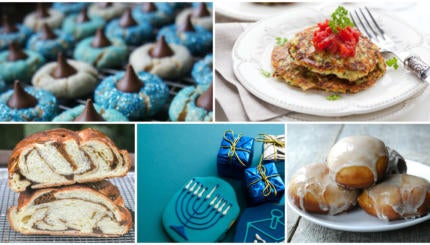Most of the Jewish kids I knew growing up partook in a handful of familiar traditions during the holiday season. They would light their menorahs, eat latkes and jelly doughnuts, and squeal in delight of the gelt they’d win from a few festive rounds of dreidel before bedtime. In my house, the traditions were very similar, except we sometimes swapped Cuban-style malanga fritters for potato pancakes. Despite the fact that my extended family represents many different religions, my parents made it clear from the start that in our Jewish home, we celebrate Hanukkah.
Conversely, my abuelos, or grandparents, native Cubans and devout Catholics, hosted an annual Christmas party. As it was the one time in the year where every single member of my large extended family would be in attendance, my parents felt strongly that we accept the invitation, as well. These parties boasted beautiful decorations ornamenting the entire house, piles of colorful gifts for the grandkids under the tree, and echoes of laughter and warmth from family members reuniting. Of course, these elements were certainly a big draw, but the main event was always the food. Oh, the food! My abuela, the original culinary matriarch of the family, made sure nobody left hungry, and always had enough food for everyone to take home leftovers of the scrumptious Cuban feast she’d make. Her Christmas parties offered the all-star dishes from her culinary arsenal: succulent roasts, creamy black beans spooned over white rice, a variety of seasonal vegetables, and just like our Hanukkah dinners, Abuela’s Christmas parties would not be complete without malanga fritters.
As dinner ended, my abuela found immense joy in passing out the Christmas gifts, and she went to great lengths to make sure that her Jewish grandchildren were not overlooked. She always had a little something for my brother and me under her tree, and unlike the gifts for my cousins, ours were always wrapped in Hanukkah paper. This small gesture not only made my brother and me feel extra special, but it was an expression of the support she showed my mother about her decision to convert to Judaism.
Through the years, I’ve attended countless family Christmas parties, baptisms, first communions, and so on, just as my family has shown their support at my traditionally Jewish life-cycle events. I’ve always loved learning about my family’s different religions, and fondly remember many a time when I stayed up late with my cousins, explaining the significance of some of the Jewish traditions I practiced. I took great pride in being the authority on all things Jewish, and made sure my explanations were always as authentic as possible. As an adult, I have a deep-rooted fascination with the world’s major religions, mentally noting the similarities and differences between them and my native Judaism every chance I get. This fascination, coupled with my early exposure to other religions, has only helped to foster my strong identity as a Jew.
I recognize that I am incredibly lucky to have been born into such a supportive and engaged, albeit religiously diverse, family. This spring, as my husband and I welcome the newest member of the tribe to our family, I hope to teach our child not only of our Jewish traditions, but to encourage respect and admiration for others’ traditions, as well.
Frituras de Malanga (Malanga Fritters)
By the TheCubenReuben.com
Prep time: 10 mins
Cook time: 25 mins
Total time: 35 mins
Recipe type: Appetizer
Cuisine: Cuban
Serves: 35 fritters
Ingredients
1 lb. malanga, peeled and coarsely chopped
½ lb. yucca (also known as cassava), peeled and coarsely chopped
3 cloves fresh garlic
1 tsp fresh lemon juice
2 tsp baking powder
2 large eggs
2 tsp chopped Italian parsley
½ tsp salt
¼ tsp freshly ground black pepper
3 cups vegetable oil (for frying)
Instructions
1. Heat oil in a large frying pan over medium heat.
2. In a food processor, grind together the malanga, yuca, and garlic. Transfer to a medium bowl.
3.Add lemon juice, baking powder, eggs, parsley, salt and pepper to the mixture, and stir until well combined.
4. Test the oil with a tiny drop of the mixture. If oil bubbles, it is ready to fry.
5. Using two kitchen spoons, drop one spoonful of the mixture into the hot oil, and fry for two minutes or until the bottom side starts to brown. Turn the fritter over, and continue to fry until golden brown throughout.
6. Taste fritter to determine if it has enough salt and pepper for your liking. Adjust batter accordingly, and continue frying. Be careful not to overcrowd the pan.
7. Remove the cooked fritters from the oil, and drain on a platter lined with paper towel.
8. Serve immediately.
Like this post?
Get the latest in MyJewishLearning’s weekly blogs newsletter
.
dreidel
Pronounced: DRAY-dul, Origin: Yiddish, a spinning top, with four sides, each marked with a different Hebrew letter (nun, gimel, hay and shin), it is played with on Hanukkah.
Hanukkah
Pronounced: KHAH-nuh-kah, also ha-new-KAH, an eight-day festival commemorating the Maccabees’ victory over the Greeks and subsequent rededication of the temple. Falls in the Hebrew month of Kislev, which usually corresponds with December.


